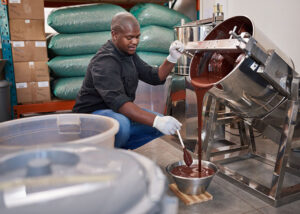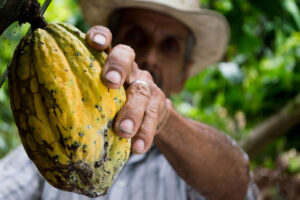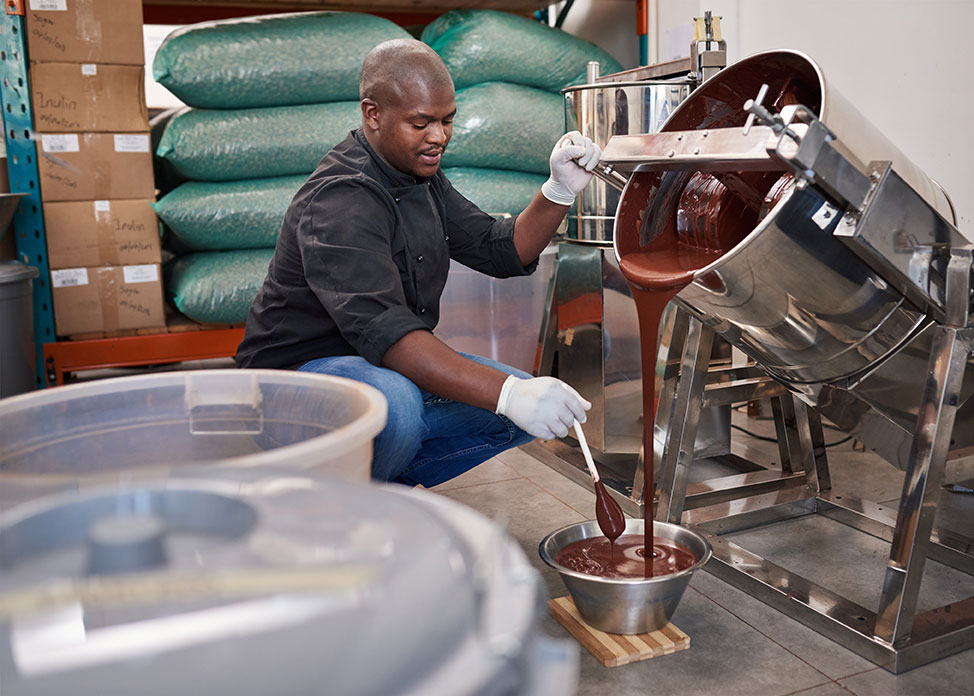Disclaimer: The information on our website is provided for general information purposes only. We make no representations or warranties of any kind, express or implied, about the completeness, accuracy, reliability, suitability or availability with respect to the website or the information contained on our website for any purpose. Any reliance on such information is therefore strictly at your own risk and we are not liable for any damages or losses arising out of or resulting from your reliance on any information contained on our website.
A chocolate maker purchases raw cocoa beans and then processes, roasts, and grinds them into chocolate. Chocolate makers are not to be confused with a chocolatier. Chocolatiers make chocolate creations from chocolate they purchase from a chocolate maker. Do you want to make chocolate in its purest form, helping farmers and the environment? What’s not to love? Check out this career!
Benefits of being a Chocolate Maker
Everyone loves chocolate! Getting to make, smell, and taste it all day is a definite benefit. Let’s review some additional benefits of being a chocolate maker. Chocolate makers find fulfillment in knowing they have the power to make people happy and bring smiles to their faces through delicious creations. They appreciate the collaborative aspect of their job, working as part of a team while also having the flexibility to work independently. For those with entrepreneurial aspirations, there is the option to start their own chocolate business, allowing them to pursue their creative vision. Additionally, chocolate makers enjoy a clean and climate-controlled work environment, ensuring a comfortable and hygienic space for crafting their delectable treats.
How to Become a Chocolate Maker

A chocolate maker generally has acquired a high school diploma. However, formal training and experience are the surest ways to enter this career field. Let’s look at how you can do that! To get the proper qualifications to enter the chocolate-making career field, an associates’s degree in the pastry arts is a great place to start. A bachelor’s degree in culinary and pastry arts also can help to broaden your knowledge of foods and flavors around the world. Other chocolate makers have gone on to get their Master’s degrees.
Culinary schools include courses in basic kitchen knowledge, such as safety and sanitation, proper use of utensils, equipment operation, and basic kitchen knowledge and cooking experience under the supervision of an industry professional. Culinary schools last anywhere from two to four years to complete. Online culinary arts courses are also available which can help those that are working while trying to advance their education.
There is also a lot you research you can do on your own. Learning all you can about the process of making chocolate from books, magazines, or even YouTube videos can be helpful. Researching apprenticeship programs through trade unions large employers is another way to move your career along. Most of these programs pay your to work in kitchens as you learn under experienced chefs.
You can also visit cocoa farms, if possible, to see the process of the cocoa bean from growing, picking, and processing. Many chocolate makers are passionate about helping these farmers sustain a good living while providing them with a good and pure product. The chocolate makers desire to help the environment is vital to the future supply of cocoa.
You can also take tours of chocolate factories to observe the process used to make a final product. Getting a job in a chocolate factory or other places that can give you experience with chocolate are also helpful when entering this career. Other jobs that may relate to chocolate making concepts include baristas (due to knowledge of beans and roasting) and yogurt, candy, or cheesemaker which is valuable to learn about fermentation. Now let’s take a look at what they do in a day.
Chocolate Making Job Description

A chocolate maker has various duties depending on the level of experience they have and the part they play in the chocolate making process. Let’s begin with a self-employed chocolate maker. These chocolate makers must start by purchasing raw cocoa beans. They develop relationships with farmers around the world.
The chocolate maker ensures their farmers are paid a fair wage, usually above the Fair Trade requirements. A good chocolate maker understands the importance of responsible farming to help protect the environment where cocoa beans are grow. This is known as farm-to-bar transparency. Once purchased, the seeds of raw cocoa beans are bitter. Chocolate makers must then ferment them to help mellow the flavor.
Roasting the beans is the next step to bring out the bean’s flavor. The chocolate maker puts the cocoa beans on baking sheets and roasts them in special ovens. They crack and sift the beans from the shell and remove the fleshy center that is edible, called nibs. Nibs are then ground into chocolate liquor that contains no alcohol but is liquid chocolate in its purest form.
The next process is called conching. The chocolate maker refines the cocoa beans by placing them through heated grinders to break down any particles. Longer conching ensures smoother chocolate. The chocolate workers then temper the chocolate in stages, heating and cooling it. At this stage, chocolate makers add any necessary sugar, cocoa butter, or powdered milk.
Chocolate makers must keep their work areas clean and sanitized to meet required standards during the chocolate-making process. They must also practice safety when operating machines at all times. The final stage is preparing the product for sell to chocolatiers. We have shown you what a chocolate maker is, what you need to do to become one, and what they do. We wish you success in this delicious career!

